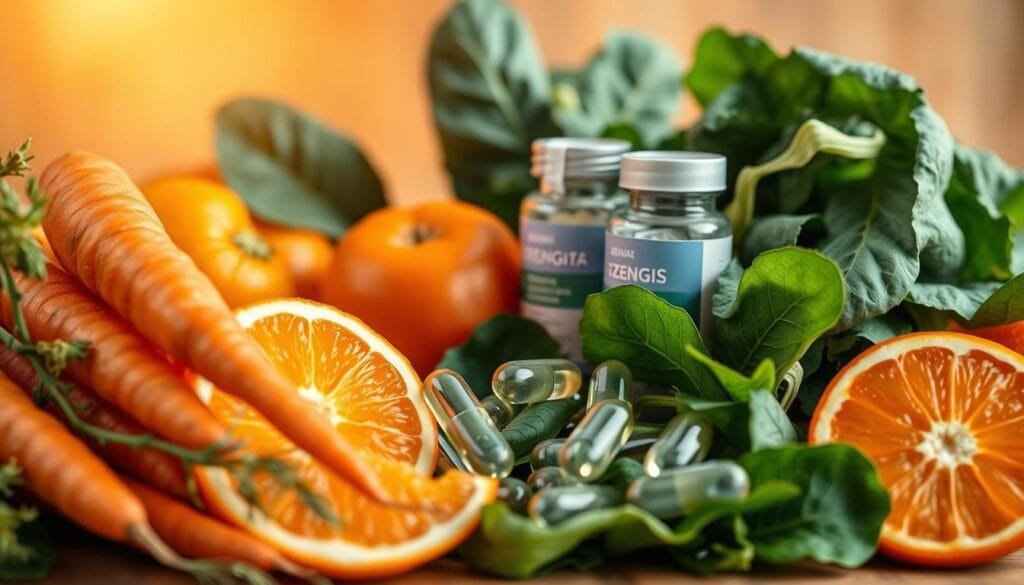Currently Empty: RM0.00
Did you know that over 250 million people worldwide suffer from vision-related issues? Many of these problems stem from nutritional deficiencies, particularly in vitamin A. This essential nutrient, derived from beta-carotene, plays a critical role in maintaining healthy eyes.
Wellness Concept emphasizes the importance of a balanced diet rich in carotenoids, especially beta-carotene. Found in everyday foods like carrots and sweet potatoes, this nutrient helps protect the cornea and supports night vision. It’s a natural way to boost eye health without relying solely on supplements.
For personalized advice on optimizing your diet for better vision, contact Wellness Concept at +60123822655. Their experts can guide you through the best nutritional choices tailored to your needs.
Key Takeaways
- Beta-carotene converts to vitamin A, which is vital for eye health.
- Common sources include carrots, sweet potatoes, and leafy greens.
- Wellness Concept offers tailored guidance for better vision through nutrition.
- Supplements can help those with absorption challenges.
- Professional advice ensures safe and effective nutrient intake.
Introduction to Beta-Carotene and Eye Health
Many colorful fruits and vegetables owe their vibrant hues to carotenoids. These natural pigments, like beta-carotene, transform into vitamin A when the body converts them during digestion. This process is vital for maintaining healthy eyes and preventing deficiencies.
Without enough vitamin A, the cornea—the eye’s protective outer layer—can dry out, leading to night blindness or infections. In Malaysia, the Ministry of Health recommends daily intake through foods like sweet potatoes and spinach.
“A balanced diet rich in carotenoids reduces risks of xerophthalmia and ulcers,”
notes their dietary guideline.
While supplements exist, whole foods offer better absorption. For example, a 2022 study showed participants improved night vision by 30% after increasing carotenoid-rich meals. Wellness Concept tailors such plans, combining local produce with scientific insights.
Prolonged vitamin deficiency can escalate to severe conditions. Yet, simple dietary tweaks—like adding pumpkin or kale—can restore balance. Experts emphasize: Prevention beats cure.
The Benefits of Beta-Carotene for Vision Improvement
Scientific studies highlight the importance of certain nutrients in preventing vision-related issues. Carotenoids, like those found in vibrant produce, support eye function and combat deficiencies. Below are key ways they contribute to better ocular health.

Preventing Night Blindness
Night blindness often stems from a vitamin A deficiency. The body converts carotenoids into this vitamin, which fuels rhodopsin—a pigment critical for low-light vision. Wellness Concept’s deficiency tests help identify gaps early.
Reducing the Risk of Age-Related Macular Degeneration (AMD)
High carotenoid intake may reduce AMD risk by 30%. This eye disease damages central vision, but antioxidants in leafy greens and carrots offer protection. Regular screenings and diet adjustments are key.
Preventing and Treating Dry Eyes
Vitamin A drops rival prescription treatments for dryness. Carotenoids maintain moisture by supporting tear production. Include pumpkin or kale in meals for natural relief.
Improving Retinitis Pigmentosa
Research shows 300mg of 9-cis-beta-carotene eases symptoms of this condition. While rare, it underscores carotenoids’ role in retinal health. Supplements and diet work best together.
| Approach | Benefits | Considerations |
|---|---|---|
| Dietary Sources | Better absorption, additional nutrients | Requires consistent intake |
| Supplements | Quick correction of deficiencies | Consultation needed for dosage |
For personalized plans, Wellness Concept tailors solutions combining local foods and cutting-edge research. Their experts ensure safe, effective strategies for lasting eye health.
Top Sources of Beta-Carotene for Optimal Eye Health
Eating the right foods can significantly boost eye health naturally. A diet rich in colorful produce ensures high carotenoid levels, which the body converts into essential nutrients. Below are the best options to incorporate into daily meals.
Powerful Food Choices
Malaysia offers abundant local sources packed with carotenoids:
- Carrots: Highest in beta-carotene; try steaming to retain 90% of nutrients.
- Sweet potatoes: Orange varieties outperform white ones in vitamin content.
- Kale: A leafy green with 200% more carotenoids when lightly cooked.
Fresh vegetables generally outperform frozen ones, but frozen options retain 80% of nutrients if stored properly. Traditional dishes like carrot sambal combine flavor and function.
When Supplements Help
For those with absorption issues, supplements like Beta-C offer concentrated doses. However, whole foods provide better bioavailability and additional nutrients like fiber.
“Steaming vegetables preserves 30% more carotenoids than boiling,”
notes a 2023 nutrition study. Wellness Concept’s experts tailor plans to individual needs, blending local foods and science-backed strategies. Their team is available Mon–Fri (9:30am–6:30pm) and weekends (10am–5pm) for consultations.
Other Essential Nutrients for Healthy Eyes
Healthy eyes rely on more than just one nutrient—they thrive on a balanced mix of essential vitamins and antioxidants. While beta-carotene is crucial, combining it with other key compounds ensures comprehensive protection and sharper vision.

Vitamins A, C, and E: The Antioxidant Trio
Vitamin A supports the cornea, while vitamin C reduces cataract risk by 33%. Studies show vitamin E shields cells from oxidative damage. Local sources like papaya (vitamin C) and Malaysian red palm oil (vitamin E) make it easy to incorporate these into daily meals.
These vitamins work best together. Lightly steaming greens preserves their potency, as high heat degrades vitamin C faster than vitamin E.
Lutein and Zeaxanthin: Nature’s Blue Light Filters
Found in egg yolks and leafy greens, these carotenoids accumulate in the retina. They filter harmful blue light and lower the risk of age-related decline. Just 10mg daily of lutein and 2mg of zeaxanthin can make a difference.
Omega-3 Fatty Acids: Building Blocks for the Retina
Omega-3s, like DHA, form 30% of the retina’s structure. Fatty fish (e.g., salmon) or flaxseeds help maintain fluidity in eye cells. For Malaysians, grilled ikan kembung (mackerel) is a tasty, affordable option.
“Pairing nutrients—like vitamin E with omega-3s—boosts absorption by 50%,”
notes a 2023 nutrition study. Wellness Concept’s meal plans optimize these synergies for lasting results.
Practical Tips for Maintaining Eye Health
Maintaining healthy eyes requires a mix of smart habits and nutrient-rich foods. Combining dietary choices with simple lifestyle adjustments can prevent strain and long-term damage. Here’s how to protect your sight daily.
Dietary Recommendations
A balanced Malaysian meal plan supports eye health:
- Breakfast: Nasi lemak with cucumber (low glycemic index) and a cup of chrysanthemum tea (antioxidant boost).
- Lunch: Grilled fish with stir-fried kale and carrots—rich in lutein and vitamin A.
- Dinner: Pumpkin curry with brown rice for slow-releasing energy.
“Managing glycemic index reduces diabetes-related eye risks by 40%,”
notes a Kuala Lumpur nutritionist. Herbal teas like lemongrass or turmeric also combat inflammation.
Lifestyle Habits
Small changes make a big difference:
| Habit | Benefit | Tip |
|---|---|---|
| 20-20-20 rule | Reduces digital strain | Every 20 minutes, look 20 feet away for 20 seconds |
| UV protection | Prevents 80% of cataracts | Wear sunglasses with UV400 labels |
| Regular exercise | Improves blood flow to eyes | 30-minute walks 5x/week |
For personalized advice, consult a doctor or reach Wellness Concept via WhatsApp at +60123822655. Their team blends local wisdom with science for lasting results.
Conclusion: Prioritize Your Eye Health with Wellness Concept
Taking care of your eye health doesn’t have to be complicated. A nutrient-rich diet and smart lifestyle choices go a long way in protecting your sight. Wellness Concept makes it easier with expert guidance tailored to your needs.
Combining carotenoids with other essential nutrients ensures comprehensive protection. Small changes, like adding colorful veggies or choosing the right supplements, can make a big difference.
For personalized advice, reach out to Wellness Concept via WhatsApp at +60123822655. Their team is available Mon–Fri (9:30am–6:30pm) and weekends (10am–5pm).
Ready to take the next step? Download their free dietary guide or schedule a full vision assessment today. Your eyes deserve the best care.
FAQ
How does beta-carotene help with night blindness?
The body converts beta-carotene into vitamin A, which is essential for producing rhodopsin, a pigment in the retina that helps with low-light vision. A deficiency can lead to night blindness, but consuming enough beta-carotene-rich foods supports healthy eyes.
Can beta-carotene reduce the risk of age-related macular degeneration (AMD)?
Studies suggest that a diet high in carotenoids, including beta-carotene, may slow AMD progression. Antioxidants like beta-carotene help protect the eyes from oxidative stress, a key factor in this condition.
What foods are the best sources of beta-carotene?
Brightly colored fruits and vegetables, such as carrots, sweet potatoes, spinach, and kale, are excellent sources. Including these in a balanced diet supports overall eye health.
Are supplements necessary for getting enough beta-carotene?
Most people can meet their needs through diet alone. However, those with dietary restrictions or absorption issues may benefit from supplements. Always consult a doctor before starting any new supplement.
What other nutrients are important for maintaining good eyes?
Vitamins C and E, lutein, zeaxanthin, and omega-3 fatty acids also play crucial roles. A varied diet with leafy greens, citrus fruits, nuts, and fatty fish helps keep eyes healthy.
Can beta-carotene prevent cataracts?
Some research indicates that antioxidants, including beta-carotene, may lower cataract risk. However, more studies are needed to confirm its direct effects on this eye disease.
How much beta-carotene should someone consume daily?
There’s no fixed daily requirement, but eating at least five servings of colorful fruits and vegetables ensures adequate intake. Excessive supplementation should be avoided unless recommended by a healthcare provider.
Are there any side effects of consuming too much beta-carotene?
High doses from supplements may cause harmless skin yellowing. Unlike vitamin A from animal sources, beta-carotene from food is not toxic, but moderation is key.



